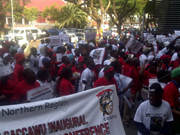UNI welcomes Stiglitz call for R2bn Walmart/Massmart jobs fund

UNI Global Union General Secretary, Philip Jennings said, “Stiglitz and Hodge have got it right. The R100 million jobs fund that Walmart was obliged to comply with after the Competition Tribunal was a drop in the ocean compared to what is really needed to promote jobs in the supply chain which risk being swept away by Walmart. Stiglitz and Hodge have recognised that a minimum of R500 million and up to R2bn over ten years is much more realistic. They have looked at the figures and seen that Walmart’s projections just don’t add up.”
Hodge representing the SACCAWU and the other unions involved in the case and Stiglitz representing the South African government have come to very different conclusions to Mike Morris, University of Cape Town professor, representing Walmart. Morris wrote his own minority report after disagreements on the content of what was meant to be a joint report.
The majority report states that the money should go to the suppliers without restrictions while Morris argues that this will benefit Walmart’s competitors.
It further recommends that Walmart should not be the sole operator of the scheme whereas the minority report argues that it should.
Jennings added, “Stiglitz and Hodge’s report is grounded in the grim reality of the situation faced by millions of South Africa workers in the supply chain who will lose their livelihoods if Walmart do not face up to their responsibilities. We want to change the rules of the game and ensure that this investment is aimed at promoting local suppliers, products and jobs. Walmart is in 14 African countries and there is the opportunity to build local capacity rather than squeeze the life out of it. We must build local capacity and not allow a flood of Walmart China-made products to overwhelm these markets”
The Stiglitz/Hodge report, which has been widely reported in the South African media before its public release, comes only days after a large group of Walmart shareholders voted against the re-election of global CEO Mike Duke. They were reacting to the allegations of widespread fraud in Mexico by Walmart’s Mexican subsidiary during Duke’s watch. In India too, Walmart is facing opposition. Its advance into the market has been put on hold after widespread protests at how the opening of the retail market to Walmart and its competitors would affect India’s retailers, traders and farmers.
Background
Last year SACCAWU and three government bodies appealed the decision to allow Walmart to buy a R16 bn majority stake in South Africa’s Massmart retail chain. The union and the government departments argued that there were not enough conditions in place to protect local manufacturers and suppliers at risk from closure because of cheap Walmart imports.
The competition authorities insisted that the Walmart/Massmart merger go ahead with certain undertakings. Namely that there should be no job cuts in the first two years, honour union collective bargaining agreements for three years and invest R100 million into a jobs fund to improve the competitiveness of the local industry.
In March of this year, the Competition Appeals Court ordered a three person panel representing the unions, the government and the company to come up with a study about how the fund should be used to protect and increase the capacity of the local supply chain. The panel has delivered two reports – the majority report from Stiglitz and Hodge representing the government and the unions and the minority report from Morris representing Walmart.

